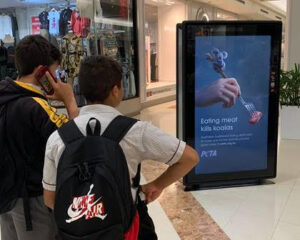 Amid further discussion around koala-protection legislation in New South Wales, People for the Ethical Treatment of Animals (PETA) has opted to remind consumers just how much power they hold by launching a Sydney-wide campaign with digital panels displaying a hard-to-swallow truth: “Eating meat kills koalas”.
Amid further discussion around koala-protection legislation in New South Wales, People for the Ethical Treatment of Animals (PETA) has opted to remind consumers just how much power they hold by launching a Sydney-wide campaign with digital panels displaying a hard-to-swallow truth: “Eating meat kills koalas”.
The campaign, currently on display on ten digital panels in five major shopping centres citywide – Bankstown Central, Broadway, Castle Towers, Macquarie Centre, and Westpoint – features a koala clinging to a branch that cleverly becomes a fork stabbing a piece of meat alongside the message, “Australian bushland is being destroyed to make way for the animals you eat. Learn more at peta.org.au.”
“Australians want to save the koala from extinction, but many are unaware of the link between deforestation for cattle and sheep grazing and koala habitat destruction,” says PETA Campaigns Advisor Mimi Bekhechi. “Every time you shop, you vote with your dollar. This campaign is designed to empower shoppers and inform Australians of the fact that, of the many threats to koalas, animal agriculture is one we can each tackle daily, simply by leaving meat off our plates.”
In Australia, the only developed nation on the list of deforestation hotspots, most tree-clearing is undertaken to create pasture for livestock. In New South Wales alone, where the main driver of land-clearing is agriculture, more than 88,000 hectares of primary forest were cleared between 2010 and 2018 alone. This not only robs native animals of their homes but also deprives the land of vital carbon sinks – trees – and, in the case of animal agriculture, replaces them with water- intensive, methane-generating animals that contribute to our nation’s carbon footprint.
intensive, methane-generating animals that contribute to our nation’s carbon footprint.
PETA – whose motto reads, in part, that “animals are not ours to eat” and which opposes speciesism, a human-supremacist worldview – notes that so long as there is demand for meat, vulnerable koalas, along with countless other animals, will be killed or left to languish without suitable food, habitats, or homes.
For more information, please visit PETA.org.au.















